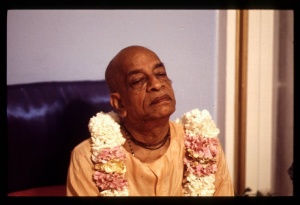SB 9.19.8: Difference between revisions
m (1 revision(s)) |
No edit summary |
||
| Line 1: | Line 1: | ||
{{info | {{info | ||
|speaker=King | |speaker=King Yayāti | ||
|listener= | |listener=Devayānī wife of King Yayāti | ||
}} | }} | ||
[[Category:Srimad-Bhagavatam - Canto 09 Chapter 19|s08 ]] | |||
[[Category:Bhagavatam Verses Spoken by Yayati Maharaja - Vanisource|091908]] | |||
<div style="float:left">'''[[Srimad-Bhagavatam]] - [[SB 9|Ninth Canto]] - [[SB 9|Ninth Canto]] - [[SB 9.19: King Yayati Achieves Liberation|Chapter 19: King Yayāti Achieves Liberation]]'''</div> | |||
<div style="float:right">[[File:Go-previous.png|link=SB 9.19.7]] '''[[SB 9.19.7]] - [[SB 9.19.9]]''' [[File:Go-next.png|link=SB 9.19.9]]</div> | |||
{{RandomImage}} | |||
==== TEXT 8 ==== | ==== TEXT 8 ==== | ||
<div | <div class="verse"> | ||
taṁ durhṛdaṁ suhṛd-rūpaṁ | :taṁ durhṛdaṁ suhṛd-rūpaṁ | ||
kāminaṁ kṣaṇa-sauhṛdam | :kāminaṁ kṣaṇa-sauhṛdam | ||
indriyārāmam utsṛjya | :indriyārāmam utsṛjya | ||
svāminaṁ duḥkhitā yayau | :svāminaṁ duḥkhitā yayau | ||
</div> | </div> | ||
| Line 17: | Line 22: | ||
==== SYNONYMS ==== | ==== SYNONYMS ==== | ||
<div | <div class="synonyms"> | ||
''tam''—him (the he-goat); ''durhṛdam''—cruel hearted; ''suhṛt-rūpam''—pretending to be a friend; ''kāminam''—very lusty; ''kṣaṇa-sauhṛdam''—having friendship for the time being; ''indriya-ārāmam''—interested only in sense gratification or sensuality; ''utsṛjya''—giving up; ''svāminam''—to her present husband, or to the former maintainer; ''duḥkhitā''—being very much aggrieved; ''yayau''—she left. | |||
</div> | </div> | ||
| Line 24: | Line 29: | ||
==== TRANSLATION ==== | ==== TRANSLATION ==== | ||
<div | <div class="translation"> | ||
Aggrieved by her husband's behavior with another, the she-goat thought that the he-goat was not actually her friend but was hardhearted and was her friend only for the time being. Therefore, because her husband was lusty, she left him and returned to her former maintainer. | Aggrieved by her husband's behavior with another, the she-goat thought that the he-goat was not actually her friend but was hardhearted and was her friend only for the time being. Therefore, because her husband was lusty, she left him and returned to her former maintainer. | ||
</div> | </div> | ||
| Line 31: | Line 36: | ||
==== PURPORT ==== | ==== PURPORT ==== | ||
<div | <div class="purport"> | ||
The word svāminam is significant. Svāmī means "caretaker" or "master." Devayānī was cared for by Śukrācārya before her marriage, and after her marriage she was cared for by Yayāti, but here the word svāminam indicates that Devayānī left the protection of her husband, Yayāti, and returned to her former protector, Śukrācārya. Vedic civilization recommends that a woman stay under the protection of a man. During childhood she should be cared for by her father, in youth by her husband, and in old age by a grown son. In any stage of life, a woman should not have independence. | The word ''svāminam'' is significant. ''Svāmī'' means "caretaker" or "master." Devayānī was cared for by Śukrācārya before her marriage, and after her marriage she was cared for by Yayāti, but here the word ''svāminam'' indicates that Devayānī left the protection of her husband, Yayāti, and returned to her former protector, Śukrācārya. Vedic civilization recommends that a woman stay under the protection of a man. During childhood she should be cared for by her father, in youth by her husband, and in old age by a grown son. In any stage of life, a woman should not have independence. | ||
</div> | </div> | ||
__NOTOC__ | |||
<div style="float:right; clear:both;">[[File:Go-previous.png|link=SB 9.19.7]] '''[[SB 9.19.7]] - [[SB 9.19.9]]''' [[File:Go-next.png|link=SB 9.19.9]]</div> | |||
__NOTOC__ | |||
__NOEDITSECTION__ | |||
Revision as of 03:52, 17 May 2021

A.C. Bhaktivedanta Swami Prabhupada
TEXT 8
- taṁ durhṛdaṁ suhṛd-rūpaṁ
- kāminaṁ kṣaṇa-sauhṛdam
- indriyārāmam utsṛjya
- svāminaṁ duḥkhitā yayau
SYNONYMS
tam—him (the he-goat); durhṛdam—cruel hearted; suhṛt-rūpam—pretending to be a friend; kāminam—very lusty; kṣaṇa-sauhṛdam—having friendship for the time being; indriya-ārāmam—interested only in sense gratification or sensuality; utsṛjya—giving up; svāminam—to her present husband, or to the former maintainer; duḥkhitā—being very much aggrieved; yayau—she left.
TRANSLATION
Aggrieved by her husband's behavior with another, the she-goat thought that the he-goat was not actually her friend but was hardhearted and was her friend only for the time being. Therefore, because her husband was lusty, she left him and returned to her former maintainer.
PURPORT
The word svāminam is significant. Svāmī means "caretaker" or "master." Devayānī was cared for by Śukrācārya before her marriage, and after her marriage she was cared for by Yayāti, but here the word svāminam indicates that Devayānī left the protection of her husband, Yayāti, and returned to her former protector, Śukrācārya. Vedic civilization recommends that a woman stay under the protection of a man. During childhood she should be cared for by her father, in youth by her husband, and in old age by a grown son. In any stage of life, a woman should not have independence.